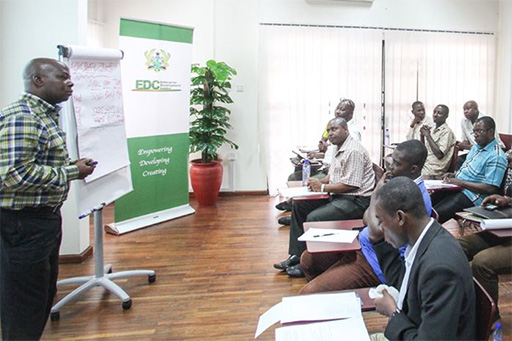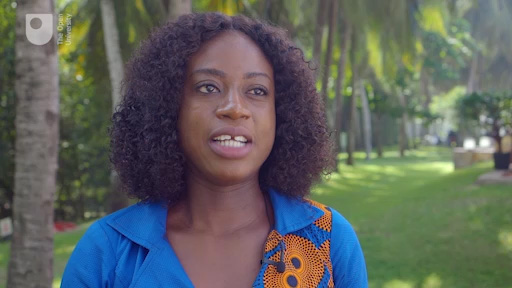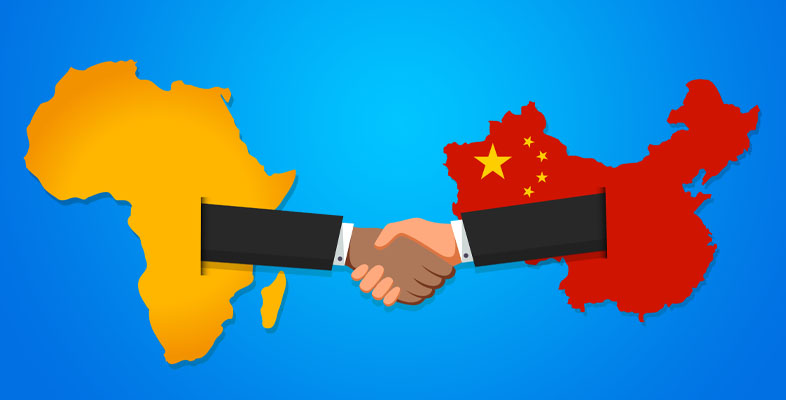3 Linkage development: Ghana case study
In this section, you’ll look into how Ghana’s local content policy has fared, and, generally, the extent to which localisation has been achieved.
Ghana started commercial production of oil and gas resources in 2010, following the first discovery of oil in commercial quantities in 2007, with later discoveries of two additional oil fields. It took the involvement of foreign capital and expertise for Ghana to realise its dream of becoming an oil producing country. Thus, at the onset of oil production in Ghana the IOCs had to play the lead role in oil production, meaning that there was very limited opportunity for local ownership of the lead firm in Ghana’s oil extraction. Moreover, Ghana’s industrial development capacity was limited when oil exploitation started and remains so. This has also meant that there has been limited potential for localisation and linkage development to take place. Meanwhile, as Ghana’s oil find has been entirely offshore, this places greater demands on technology, capital and skills, compared to the extraction of onshore resources.
Another obstacle has been the small size of Ghana’s banking industry and financial market, which has meant that cheap and long-term capital is hard to find locally. Interestingly, estimates indicate that Ghana’s three main oil fields – Jubilee, TEN and SGN fields – on average cost USD 6 billion per project to develop, a figure approximately equivalent to half the entire assets of Ghana’s banking sector (The Economist, 2015). Thus, the potential for local equity participation in the supply chain of oil extraction in Ghana is limited.
It was on the back of these constraints that Ghana’s Local Content law was enacted in 2013. Among many other requirements, the law says that:
- an indigenous Ghanaian company should have first preference in the granting of petroleum agreement
- at least 5 per cent equity participation of an indigenous Ghanaian company is required for any entity to qualify for a petroleum agreement
- a joint venture with at least 10 per cent equity participation for an indigenous Ghanaian company is required for a non-indigenous company that intends to be engaged as a supplier
- foreign companies must also have capacity development plans that need to be approved by the sector regulator.
Regarding direct employment and purchasing of goods and services, the following targets have been set:
Petroleum (local content and local participation) regulations, 2013
First schedule: minimum local content in goods and services (regulations 1(c), 10 and 18).
Part 1: local content levels to be attained from date of effectiveness of licence or petroleum agreement.
Generally, the Local Content law appears to have been helpful. The lead IOCs’ orientation towards local linkage development has been positive. In contrast to IOCs’ historical scepticism about local suppliers, the lead IOCs in Ghana provide some support to local companies to take advantage of opportunities in their supply chains. Evidence gathered as part of our research into Chinese oil companies in Africa indicated that the IOCs go ‘the extra mile’ in ensuring that local companies they contract themselves use local sub-contractors in the discharge of their contractual obligations for some projects. Moreover, they also ensure that when a local company wins the bid for a contract which was previously placed with an international company, the particular service or contract remains reserved for the local company. In terms of employment, a lead operator in Ghana (Tullow) says it has achieved 73 per cent localisation, though localisation in management and technical roles may be significantly lower than non-technical and low-skill roles.
The IOCs have also carried out capacity development initiatives, providing training and support to local companies and individuals. Typical examples include establishment of the Enterprise Development Centre (EDC), a joint venture by Tullow Oil PLC and the Government of Ghana to provide training and support to local companies, and the Jubilee Technical Training Centre (JTTC), which offers technical training in oil and gas to individuals.

Some local companies have subsequently benefited from the supply chains of the lead IOCs in Ghana but several challenges still remain. For example, the depth of local content in the supplies of the local companies remain questionable. Given the country’s low industrial base, a large proportion of the supplies of local companies to the lead firms may be imported. Moreover, indigenous equity participation in the petroleum agreements is virtually non-existent, because specialised and long-term capital is locally unavailable, leading to the situation where locals ‘front’ for foreigners. This also raises questions about whether there was some arbitrariness in the Local Content law’s policy’s targets or whether some of them were just unrealistic.
Activity 2 Ghana’s experience of linkage development
While the previous section highlighted some of the successes of local content legislation, translation into tangible benefits has not been without its challenges. What follows is a short video and an excerpt from a report on local content implementation. As you watch and read, list what you see as the main barriers to the development of linkages.
Ben Boakye and Pauline Anaman from the project partner organisation Africa Centre for Energy Policy (ACEP), Richmond Atta-Ankomah from the University of Ghana and Kojo Asante from the Ghana Centre for Democratic Development (CDD-Ghana) summarise some of the issues Ghana has faced trying to develop better local linkages.

Transcript: Video 2 The challenges to local linkage in Ghana
Now read the following which is a section taken from a report written by the IMANI Centre for Policy and Education (2018) that looks at the successes and barriers to institutionalising local content in eight countries and across five sectors. It is an analysis of the oil and gas sector in Ghana.
Local content in Ghana’s oil and gas sector [Tip: hold Ctrl and click a link to open it in a new tab. (Hide tip)]
While statistics, such as those showing the rise in the number of indigenous companies operating in the sector since the introduction of local content legislation, are indicators of progress toward greater linkages in Ghana, it is clear many challenges remain. Some of the key issues with localisation identified in the video and passage include:
- Limited numbers of local suppliers preventing benefits from trickling down to the rest of society more broadly.
- The capital-intensive nature of the sector means few indigenous companies have the financial assets necessary to meet the 5% investment requirement.
- A lack of investment in value creation and skills specialisation mean that high levels of revenue have to be spent on outsourcing to foreign companies. Building on from this problem is an external constraint. Foreign companies need to prove they are meeting international sector standards and few local companies have the expertise or staff with the qualifications to meet these requirements.
- Growth in local employment and goods and services in the oil and gas sector are encouraging but there remain poor levels of linkages being made to other sectors of the economy.
- Local content policy may be at odds with foreign investor approaches - wanting to bring in their own suppliers and contractors. The desire to attract this investment can override the political will to enforce local content legislation effectively.
- Practices such as ‘fronting’ for foreign companies hinders effective regulation, which is linked to the wider issue of opacity around oil sector operations. In addition, it was explained that a lack of capacity within government agencies prevents effective monitoring and evaluation to assess the impact of local content provisions.
Within the IMANI report, one interesting point was an apparent awareness within the Ghanaian government that the local content LI 2204 regulations may have, from the outset, been too ambitious in terms of timeframes and policy targets. Related to this observation, in the video, Dr Richmond Atta-Ankomah stressed that time was a key factor in explaining why Ghana was struggling to create linkage development. Compared to Nigeria and Sudan, localisation and linkage development may appear relatively low, but the oil sectors of these countries are decades old, so we would expect their linkages to be better. So, while Ghana may have significant progress to make in terms of localising development outcomes, time and lesson learning from other contexts may mean it enjoys greater benefits over the longer-term.
